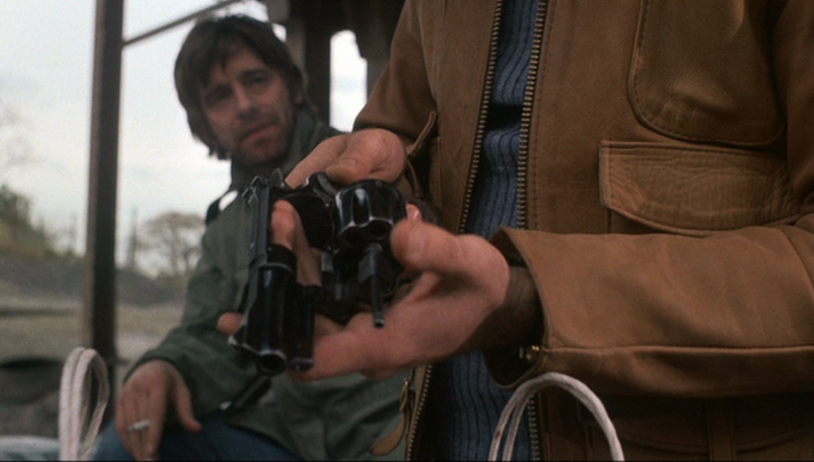
THE MOVIE SHELF: comparing films to their literary counterparts
THE FRIENDS OF EDDIE COYLE
peter yates, 1973
Welcome to Movie Shelf, an ongoing series that compares the films on our dvd shelves to the novels on our bookcases.
We at the 'smoke have always been fascinated by screenplay adaptation: what a script writer takes from the source material, what gets discarded, how the two works differ from each other and what the existence of the movie itself says about the book (and vice versa.) It's "book versus movie" time.
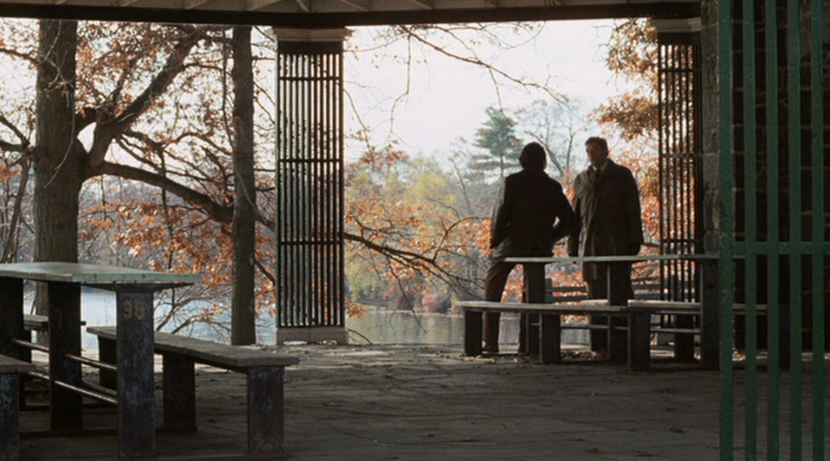
based on the novel
THE FRIENDS OF EDDIE COYLE
george v. higgins, 1972
~ by christopher funderburg ~
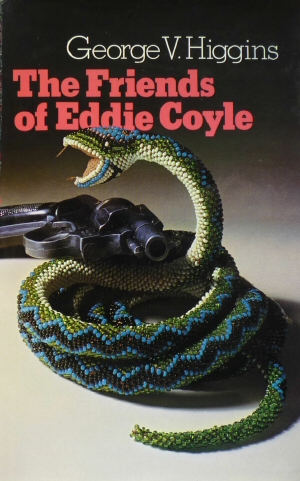
I ran into Film Comment Editor-at-Large Kent Jones a short while ago and mentioned to him that coincidentally I had just been reading his excellent liner notes for the Criterion edition of The Friends of Eddie Coyle. We're screening the film at the Jacob Burns Film Center as part of a larger series of crime novels-turned-movies and I brought up his liner notes as part of pitch to get him to actually come speak after one of our screenings. We talked for a while about how awesome Peter Yates' 1973 film is, but after a moment I said "That film is great. But the book is -" And he interjected "- something special." We both agreed that the film works, but that the book was something else altogether, something richer and rarer than the film.
That's a fairly usual problem: great novel, notably inferior film. And I guess you could file Eddie Coyle away in those terms and be done with it. But I think the situation with the book versus the film in this particular case is actually a real rarity: excellent film / unique novel that definitely isn't the film. It's not even that assistant D.A.-turned-author George V. Higgins novel is great, it's that it has a singular voice and perspective that's shocking even now - I can only image how it felt back in 1970, what an eye-opener it must have been. Elmore Leonard said it taught him how to use profanity in dialog, for fuck's sake.
If The Friends of Eddie Coyle was not a game-changing novel for the crime genre, it is only because it represented the farthest the form could go in a certain direction. It didn't redirect the flow of the genre - it followed a single, long-trickling tributary to its decisive end. From its inception, the hard-boiled novel has been defined by its language; not the language of its omniscient narrating authorial voice, but the language of its characters.
Dashiell Hammett threw down the gauntlet with his bold use of slang - it's tough to imagine a time when simply having a character say "yeah" would have been considered radical, but keep in mind, Hammett was rebelling against his contemporaries coming out of the prim and proper British Mystery school, against would-be Agatha Christies and their eloquent, brilliant Hercule Poirots unraveling the clever-enough-to-be-idiotic criminal plots. These books and their "Dear sirs, if I mayhaps propose an unorthodox but irrefutable solution to this ignominious assassination: it was not a single man in this house who committed these crimes, but everyone here in this house!" would be blown to smithereens with Hammett: "Burn them out, Fat" and then gangsters dynamite the place and shoot the surrendering survivors down in cold blood, in broad daylight, in front of everyone, no clever mystery locked away in snowbound room.
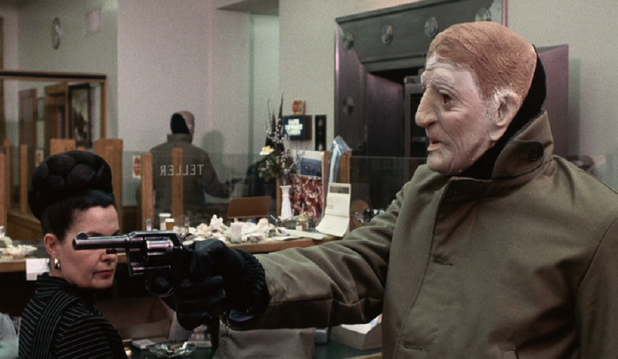
Hammett's work, of course, can get absurdly slangy and time has diminished a bit the effectiveness of what likely felt like realism to stunned readers in the 1930's. His most enduring creation, the charming detective duo Nick and Nora Charles, definitely feel of their era (in part because they helped define one corner of it) even with their timeless excessive alcohol consumption and cynicism-tinged irreverence. As characters, they're a rebellion against the dourness and absurdity that followed in the wake of Edgar Allan Poe's detective stories and Sherlock Holmes' plausibility-antagonizing plots, but they don't quite escape the larger shadow: with Hammett and his equally influential So-Cal follower Raymond Chandler, the criminal plots are more blunt and brutal, but no less extravagant and convoluted. Their dialog, the striking stylization of the way in which their characters speak, more or less put to bed the previously dominant style: following Hammett, crime novels were defined by the way their characters spoke, the tough-guy patois that seemed to take pride in its frequent incomprehensibility and callowness - verbal violence lovingly directed in part at the reader. The realism of their characters' speech, of their slang, sent the genre down a path towards authenticity: authors got the idea that realism was what Hammett's readers were responding to, so they copied it with brutality and ugliness sometimes standing in for realism; slang, cynicism and violence as a shortcut to "reality."
And oh Señor Pink Smoke reader, The Friends of Eddie Coyle is a book in which the characters speak. It's frequently described as consisting of almost nothing but long sections of dialog - that's certainly true of its follow-up and semi-sequel Cogan's Trade (recently adapted into the excruciating Killing Them Softly) but that characterization is a bit of an exaggeration with Friends. Friends still has a fair amount of descriptions of people & places (a.k.a. "traditional scene-setting") and small bits of dialog-free active business like the opening scene where Coyle doubles back through a supermarket to make sure no one is following him to his snitchin' appointment with a cop (named Dave Foley?)* Nitpickery aside, it's a dialog-heavy novel. Probably as dialog-heavy as a novel can be without becoming unreadable (and make no mistake, some of Higgins' subsequent stuff borders on unreadability precisely for that reason.) The Friends of Eddie Coyle took the identity of the genre set in motion by Hammett in the 1920's to its logical extreme: by authentically reproducing the roundabout, profane, frequently inane conversations of low-life criminals, an exacting realism could be realized in regards to the criminal world, the nature of crime and those who commit it. Higgins purportedly replicated large swaths of dialog verbatim from his time as criminal lawyer, conversations which he had both participated in and overheard. And the realism of it, of its mundanity, circular logic, restlessness, ball-busting and outright stupidity still hits with the impact of a sledgehammer - it's not a book that will make you smile at its cleverness, it's one that will knock you square on your ass. It's like getting cold-cocked in a bar fight that you didn't realize had started already.
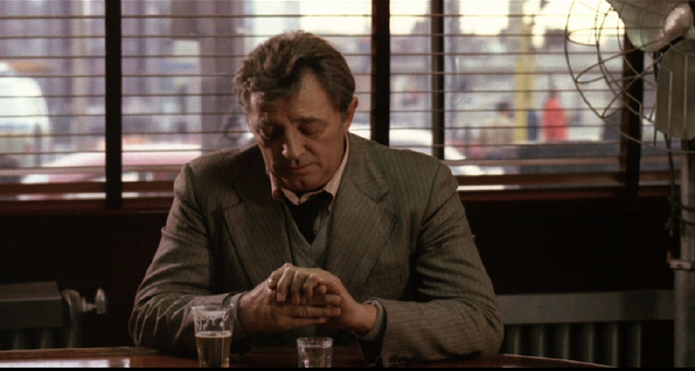
But there's an essential modesty to the book. Eddie Coyle is a small-time middleman and the plot more or less follows his attempts to weasel his way into a job snitching for the cops so that he can avoid doing a small bid for transporting stolen property. It's the story of a guy trying to become a snitch. Based out of Boston, he's got a grand jury hearing up in New Hampshire in a couple weeks concerning a mob truck full of Club Canada he was caught driving and he's not looking to go back in the joint even for a couple years. The cops don't particularly give a shit about him - he's a stocky clown who never provides them with any useful info. And he's a nobody: his main activity in the book is acting as a middleman between a group of bank robbers and a gun dealer. He doesn't rob banks himself and you don't get the impression any of his compatriots think he's much use. He's nicknamed "Eddie Fingers" because he got his hands smashed in a desk drawer as retribution for previously screwing up this simple task of acquiring legit, more or less untraceable firearms. Jackie Brown, the gun dealer, comes across as the savviest (certainly hardest working) of any of the knuckle-headed crooks traipsing through the story and I'm not sure Higgins cares if you're rooting for him or Coyle when Mr. Fingers sees him with a trunkload of machine guns and decides to sell him out to the cops. The book has a startling matter-of-factness about it, a total lack of magnetic or charming human beings, no Nick and Nora Charles spouting one-liners or Philip Marlowes wryly commenting down at the underworld as they maneuver just above it all.
Reading the book, you get the sense, finally, that this must be what the criminal world is like. No embellishments. No horseshit and gunsmoke.
Again, it's the dialog that hooks you: the endless conversations recounted therein are frequently hilarious, strange or grimly compelling. The nuts and bolts of the small-time wheeling and dealing proves hypnotically fascinating, an insider's tour of a world relentlessly portrayed on television and in the movies and in other books but never with this level of truthfulness: this is how it works. So what if Eddie Coyle isn't much more than a craven idiot and the bank robbers are the kind of dull, casually misogynistic jerks you'd go well out of your way to avoid in real life? I've always thought that liveliness is one of the most overlooked (and mysterious) qualities an artwork can possess; that "jumps off the page" quality commonly associated with the crassest and most calculatingly manipulative entertainment... but truthfully shared by almost all of the most enduring novels and films ever created. What are centuries-old evergreens like Jacques le Fatalist and Gargantua and Pantagruel if not lively? Coyle achieves a peculiar brand of liveliness, one in which the monotony of dullards leading depressing lives jumps off the page through the sheer force of the authenticity of their behavior. The book is alive in some strange way, lively for its aliveness. There's no way that Higgins intends for you to like any of the characters in his book, not even the cops, but the overall effect is charming, compelling, page-turning stuff about the minute details of acquiring a cache of machine guns from drug-addled soldiers to sell to clueless hippie-militant types.
As much as Hammett and Chandler were characterized by their cynicism (the word "hard-boiled" itself meant to describe a type of emotional deadness shared by those new-style detectives), it would be tough to describe Coyle as cynical. It's too casual and mundane - a cynical worldview would throw everything off balance. Coyle & Brown aren't driven by a knowing and skeptical world-weariness, they lives their lives with a lack of purpose & reflection commensurate with cubicle-dwelling office drones. The novel is a plain view of the criminal world, those whose job it is to operate outside of the law. No heroes, no villains, no wiseguys, no brilliant detectives or amoral badasses. Higgins puts on display men with, yes, a natural toughness and inarguably a comfort & familiarity with violence, but not tough guys. A man like Donald Westlake's classic unflinching badass Parker character couldn't exist in the world Higgins has explicated, nor could a smart-mouthed moralist like Philip Marlowe.
The criminal plots lack extravagance - with its depictions of bank robberies, the book could I suppose be located within the burgeoning caper genre of its era, but its crimes' straight-forward simplicity couldn't have less in common with those books' (and films') essential outlandishness. It might also be tempting to describe Coyle's world as amoral, but these men are deeply bound to the system of moral codes as enforced by "the boys back in Providence." There's a criminal code, not one involving honor, but the understanding that if you fuck up, you will get your hands smashed in a desk drawer. Nothing personal or nothing. Coyle weasels around with this code and thinks he's found a decent mark in the unaffiliated Jackie Brown, the book's closing irony a moral comeuppance for Coyle based on codes he truly didn't violate. Higgins does a great job of pulling apart the moronic mechanics of the thought process that leads to Coyle's demise, the mistaken notions of "truth" and "what must have happened" that put a bullet in the back of the wrong guy's head.
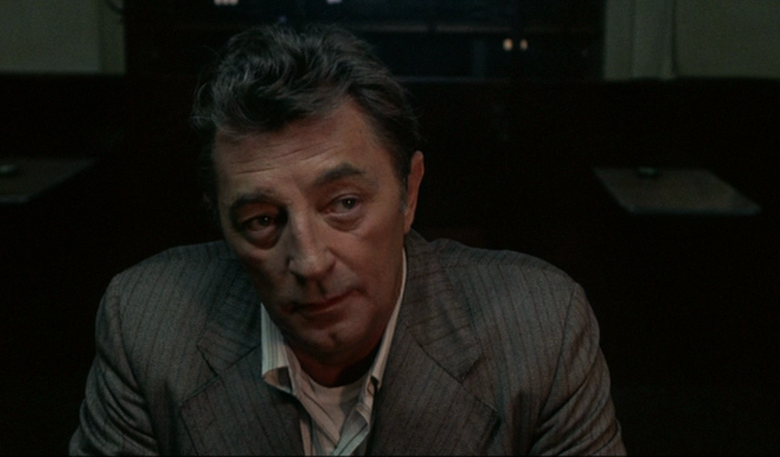
The film is not that. The film is an excellent little caper movie about some bank robbers, a gun dealer and the likable schmuck caught in between them. It has a super-funky score, unobtrusive direction, 70's New Hollywood grit and killer performances by Peter Boyle as bartender Dillon (the character tying the book most directly to Cogan's Trade), Alex Rocco as bank robber Jimmy Scalisi, Steven Keats as Jackie Brown and a never-sleepier-looking Robert Mitchum as Eddie Coyle. Everyone in the film is perfectly cast - they even snuck in noted creep-actor extraordinaire Joe Santos! - and there's not any element of it that doesn't feel realized to the filmmaker's exact intentions. The intentions are just a little simpler than the book's: you know that's coming when you hear Mitchum has been cast as Coyle. In the book, you can't help but picture Lawrence Tierney's shorter, fatter, uglier brother in the role, some sad sack piece of shit who couldn't catch a break in life because they don't deserve a break in life. Mitchum is, of course, Mitchum. I'm already on his side - casting him is a stroke of genius on the part of Yates because Mitchum has always had animal magnetism, movie star charisma and heavy-eyed sleaziness in spades of equal size and shape. He's probably the only actor who could have believably delivered his dialog without undercutting its mundanity and desperation but still managed to be likable and worth rooting for. That assumes you want Coyle to be likable and worth rooting for. Higgins doesn't care. Yates is making a movie and has a budget to recoup.
Keats is a weird choice for the role of Brown, who in the book reads like an unflappable hip young cat. Casting the guy who called Charles Bronson "dad" in a whiny way too much in Death Wish is a strange way to go with it, but he's great. His casting opposite Mitchum also allows Coyle to become more of.... if not the hero then the protagonist. He's dorky enough that Mitchum snitching out that kind of a loser feels less cowardly and opportunistic than it reads when Coyle does the same thing in the book. Keats' general gap-toothed dorkiness also lends a bit more tension to the scenes where he's playing things overly conservative - he's a naturally neurotic screen presence and his antsy-ness feels like it could boil over into violent, desperate mistakes at any moment. When Yates adds to the story a car chase and a shoot-out between Brown and the cops, the casting of Keats makes it play more smoothly. In the book, Brown is smart enough to take the pinch and go down quietly when he knows he's been set up. On the other hand, though, Brown's threats to get revenge do have more weight in the novel - when Keats whines the same lines I thought "Oh yeah, how are you going to do that while serving a life sentence, you goddamned wiener?" But yeah, the movie adds car chases and shoot-outs. You can't fault it for having a painstaking police surveillance pay off in shotgun blasts, shattered windshields and screeching rubber, but I think you can understand how that's at odds with the more down-to-earth world Higgins has written. A pro like Brown wouldn't be stupid enough force a show-down with the police, even if he knew he was going down for a hard rap on the life-sentence "possession of illegal machine-gun" charges.
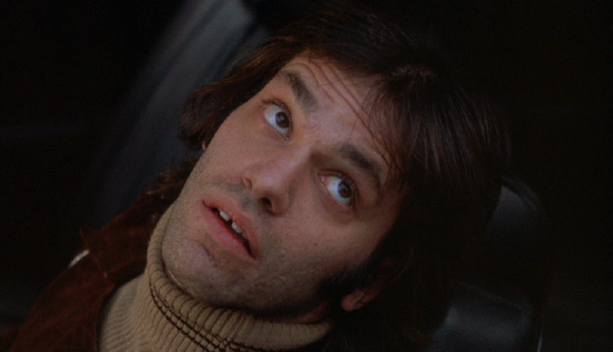
Yates and screenwriter Paul Monash also shift the focus to the bank heist, having their depictions occur earlier in the narrative rather than as the after-thought they are in the novel. The film also makes sure the heists involve increasingly sillier disguises. For it is a heist movie and what would a heist movie be without silly and/or ironic masks? The robberies take up a very small portion of the book, but take up nearly 20% of the screen-time in the film. Again, these sequences are great and it's not my idea to criticize the movie for shifting focus more directly on them or even suggest that these changes are somehow inferior - the two extended robbery sequences in the film are, for my money, among the best of the their kind, right up their with the beachside heist at the opening of Jean-Pierre Melville's Un Flic and the silent take of Rififi. The robbery scenes have incredible tension and retain the book's striking realism - they can stand toe-to-toe with any other film in the genre and they don't particularly screw with any of the details of the novel that generate its striking realism. It's just a matter of switched emphasis, a switch from the mundane to the exciting, a switch of emphasis away from circular conversations in ratty diners about utter bullshit in favor of masked men with clever plans and hair-trigger tempers.
That switch in narrative emphasis isn't nearly as striking as the how the dialog has been cut. In the book, Peter Boyle's casual snitch bartender Dillon reads like a man deeply full of shit who says almost nothing of value in his encounters with Dave Foley, but goes on and on about his domestic life - his sequences chatting with the cops for a regular $20 payoff are some of the longest, most pointless chats in the damned thing. When people talk about the endless reams of bullshit conversation in the novel, they're mainly talking about the Dillon passages. It's natural for the filmmakers to cut these sections down, but they remodel Dillon's character in the process and make him more of a menacing insider from the get-go. In the book, his inessential nonsense is essential to the character and the late book twist that outs him as a ruthless, trusted mob enforcer has a stunning heft - this guy is the book's toughest hombre?! Higgins makes Dillon seems like some idiot wasting the cop's time until the very end of the story when you can finally see that he's using the cops far more than vice verse.
In the movie, he's pretty quickly played as a heavy and the major difference in the character's portrayal is his speech patterns - from the moment he appears on screen, you know he's The Guy simply because of how he speaks. That's the difference... well, that and instead of being a trusted wiseguy, he's instead a rat who sells out the robbers and Coyle, giving the robbers over to the police and then convincing his bosses that Coyle was the man who did it. In the book, he's a shrewd insider who uses his relentless boringness to mask how well-connected he is - by keeping the cops close, he's playing them for suckers, getting a bead on where they're at and playing them into the hands of the boys back in Providence while giving them nothing of value in return but bullshit about his family life. He keeps talking as a way of not having to talk.
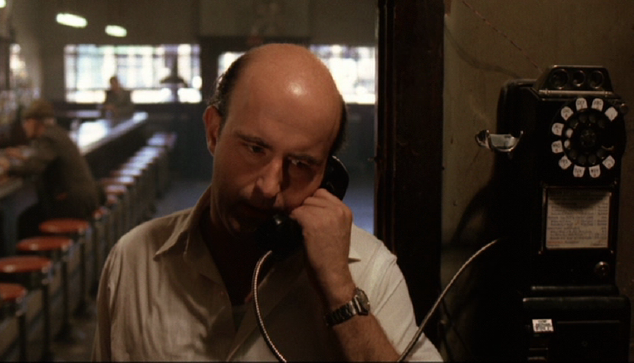
By making Dillon the rat and instigator, the film drops the book's over-riding theme and that's really the only complaint I have about the movie. Which I suppose is kind of a big complaint. In the book, the robbers are sold out by a jilted girlfriend, a beautiful young woman who gets fed up with being treated like a worthless piece of ass by a gaggle of meat-headed assholes. No one ever correctly surmises it was she who went to the cops, Dillon mistakenly assumes it was Coyle since they know he has the grand jury hearing coming up and that his selling out Jackie Brown wasn't enough to get into the D.A.'s good graces. No one gives a shit Coyle sold out an independent operator like Brown, but Scalisi and the other bank robbers are mob associated, so Coyle ends up with a ridiculous death sentence for a moral code violation of which he isn't even guilty. The movie's use of Dillon keeps that irony, but streamlines the process and all but eliminates the girlfriend character (she does appear in a single scene, but seems pretty happy with her situation and Scalisi's reverence for her "electric pussy.")
Story-wise, the switch makes everything more straight ahead and simple, but the circular, faulty logic of its characters is what makes the book so special. Even more than that, the book is about how these men are ruled by their domestic lives, one of Coyle's major motivations for avoiding prison being how much a second bid would humiliate his poor kids. The circular, go-nowhere conversations only go nowhere if the intended destination is an explication of their criminal plots; they go quite deep into these men's thoughts and feelings about women, marriage, mistresses, cheating, virility and countless relationship-related topics. These characters are most funny and silly and likable in the context of their wives and girlfriends - the movie doesn't jettison this altogether, it just makes Coyle a loving husband, which is not precisely the concept in the book. These men are husbands and boyfriends and their masculine posturing and essential pathetic qualities are illuminated by their sad, hilarious talk about women. Of course a disrespected, independently-minded woman causes their downfall!
That's maybe the final thing to be said about the book and what the excellent film can't quite capture: there's a humanity to their speech and a realism for how relatable their conversations about women are to any audience. Sure, they're lunk-headed and shooting themselves in the foot, but I think most men are deeply familiar with that feeling when it comes to women. The hard-boiled genre has always been a "man's man" kind of place and Higgins' exploration of how these feelings of fear and regret explode into hollow boasting if not outright misogyny are another way in which The Friends of Eddie Coyle follows one of the genre's tributaries to a dried-up riverbed: it achieves not only the ne plus ultra depiction of the mechanics of crime, but of the tough guy mindset's relationships with women, stripping down all of the defense mechanisms and emotional confusions that come with the territory. I'm not sure where else there is to go in the direction of "realism" after what Coyle has accomplished. But the history of women and the hard-boiled genre, that's a whole 'nother conversation, fat.
The film The Friends of Eddie Coyle awesome, the book's what is.
~ 2013 ~
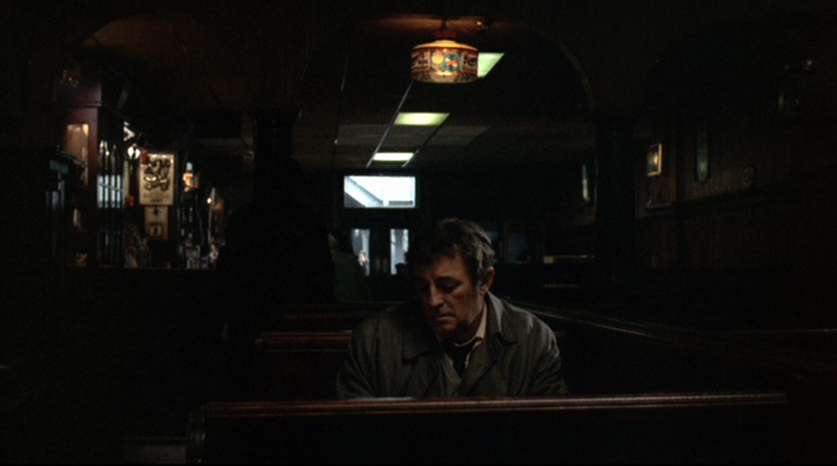
* How come no one on the internet has cut together a wacky scene with that clip of Robert Mitchum walking up to a pay-phone, making a call and demanding "quit farting around, get me goddamned Dave Foley" followed by some hilarious clip of Dave Foley in a Kids in a Hall or News Radio sketch chatting back at him? This is what the internet is for. This is why our government decided Youtube can't be sued for egregious copyright violations: so we can do shit like this. Get on it, kids.









